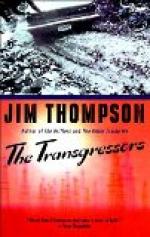“My death, like those of the committee who have already fulfilled their pledge, is not suicide, but part of the inevitable price of liberty.”
The pistol is raised to his temple. Then a thought flashes upon him. “Your death will come as an ante-climax to the election. It may be the means of defeating the Independents.”
This thought causes him to lower the pistol.
“To-morrow,” he mutters.
At daybreak Nevins is at the headquarters and remains near the chief operator, eager for every detail of the election.
“What is the weather prediction?” he inquires.
“Generally clear; light local rains on Pacific seaboard.”
“I am most intensely interested in the result of the election,” Nevins confided to the operator, to explain his presence at headquarters. “I have come all the way from San Francisco to congratulate Trueman on his election.”
“I’m afraid you’ll be disappointed. Mr. Trueman is at his home in Wilkes-Barre.”
“Well, I shall telegraph him my congratulations. I want to be the first man in the United States to send him an authoritative message confirming his election. If you can arrange to let me have the news first, when it comes in, and will send my message, I shall be glad to pay you for the service.”
“I have the wire that will send him the news,” the operator states as he pats a transmitter on the desk before him. “What do you call a fair payment for the message?”
“Twenty-five dollars.”
“I’ll send your message.”
Nevins gives the required sum, and sits at the elbow of the man who is to flash the news of victory to Trueman.
In Wilkes-Barre the day has dawned auspiciously. Trueman is among the first to perform his duty as a citizen. After voting he returns to his home.
With his wife at his side he reads the dispatches that come in by a private wire from headquarters.
“I am happier to-day than I ever was in my life before,” Ethel tells him. “And I know that you will be elected.”
“I hope your words come true. But whether I am President or not my campaign has not been in vain. I have won the fairest bride in the world, and she and I are doing a real good with a fortune that might have been a curse.”
“Now I can understand the words that are a mystery to so many of the rich: ‘It is more blessed to give than to receive,’” Ethel says, as she places her hand on her husband’s shoulder. “Now I can appreciate the emotion that impelled you to give the one thousand dollar check to the miner’s widow.” As they sit together, through the long day, they discuss what they will do for the improvement of the people, there is no provision for the repayment of anti-election promises to the managers of trusts; no talk of rewarding henchmen with high offices.
By five in the afternoon the messages begin to announce the forecast in the extreme Eastern states.




